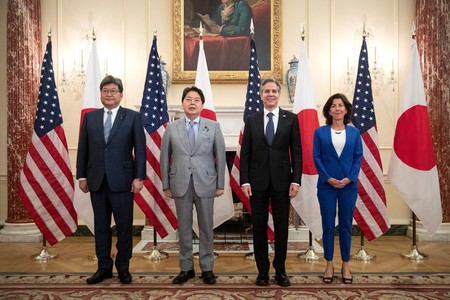Tokyo, 30 July, /AJMEDIA/
The top foreign and economy officials of the United States and Japan on Friday vowed to work together to defend an open, rules-based international economic order and address the vulnerabilities in their supply chains for key technologies such as semiconductors during their first ministerial economic “two-plus-two” meeting.
The agreement underscored the growing awareness among the two close allies that enhancing economic security is vital for their overall security, at a time when China is increasing not only its military might but its economic clout in the Indo-Pacific and Russia’s war against Ukraine is creating food and energy supply concerns.
Emphasizing their joint leadership in enhancing prosperity in the region and beyond, the two countries said in a statement that they will strive to make their economies “more competitive and resilient” and are “committed to countering threats to economic security and to the rules-based international economic order.”
They also came up with an action plan that focuses on efforts in four areas — strengthening supply chain resilience, countering economic coercion, securing critical technologies and infrastructure, and pursuing peace and prosperity through the rules-based economic order.
“We have been able to turn a new page toward further deepening the Japan-U.S. alliance,” Japanese Economy, Trade and Industry Minister Koichi Hagiuda said at the outset of the talks, which were co-hosted by U.S. Secretary of State Antony Blinken and Commerce Secretary Gina Raimondo in Washington.
Japan and the United States have long held “two-plus-two” talks involving the countries’ foreign and defense chiefs to discuss security issues, but the leaders of the two countries agreed in January this year to establish an economic version of the dialogues.
Japanese Foreign Minister Yoshimasa Hayashi expressed concerns about “prominent” attempts to use economic influence unfairly and opaquely to modify the existing international order and highlighted the importance of discussing foreign policy and economic policy as “a unit” in dealing with such challenges.
Japan and the United States welcomed their progress in exploring the development of next-generation semiconductors, expected to be used for artificial intelligence, quantum computing and other purposes, and agreed to advance efforts to foster supply chain resilience in other sectors such as batteries and critical minerals.
The semiconductor supply chain has been increasingly under scrutiny as the coronavirus pandemic has triggered a global shortage of the essential components used in everything from smartphones and laptops to cars as well as national defense systems.
The United States is also mindful that the world’s semiconductor manufacturing capacity is concentrated in East Asia, with Taiwan accounting for 20 percent of the global total in 2019, followed by South Korea, Japan, China and the United States, according to a June 2021 report by the White House.
In the action plan, Japan and the United States also pledged to coordinate with other like-minded partners to “address and respond to economic coercion, effectively confront non-market policies and practices, and deliver calibrated messaging to the international community.”
They will also continue joint efforts to enhance export controls on critical and emerging technologies, including surveillance systems, so that they will not be misused by malicious actors.
There is growing concern that the use of surveillance tools and other technologies by authoritarian governments is leading to serious human rights abuses, such as censorship of political opposition, tracking of dissidents, intimidation of minority communities and the undermining of free expression.
Reiterating their condemnation of Russia’s aggression against Ukraine, Japan and the United States said they will work together to mitigate the impact of the war on energy and food markets.
They agreed to strengthen investment in the energy sector and ensure secure energy resources in the near term, including liquefied natural gas, in response to the current crisis, and pledged to work together to create more resilient nuclear supply chains.
“The United States and Japan stand for open, sustainable, and inclusive economic growth that delivers prosperity, upholds democratic values, reduces economic disparities, and protects human rights in the Indo-Pacific region and beyond,” the statement said.
The vision will also be promoted including through the Indo-Pacific Economic Framework, a U.S.-led economic engagement initiative joined by more than a dozen countries including Japan, it added.

